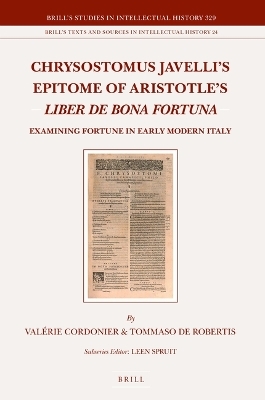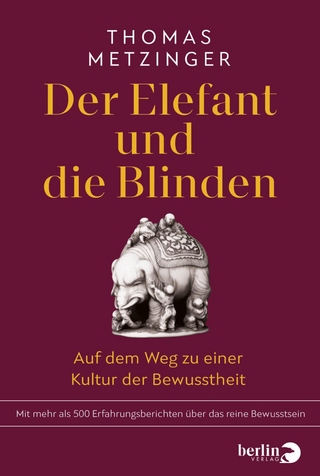
Chrysostomus Javelli’s Epitome of Aristotle’s Liber de bona fortuna
Brill (Verlag)
978-90-04-41615-4 (ISBN)
In this book, Valérie Cordonier and Tommaso De Robertis provide the first study, along with edition and translation, of Chrysostomus Javelli’s epitome of the Liber de bona fortuna (1531), the famous thirteenth-century Latin compilation of the chapters on fortune taken from Aristotle’s Magna Moralia and Eudemian Ethics. An Italian university professor and a prominent figure in the intellectual landscape of sixteenth-century Europe, Javelli (ca. 1470-ca. 1542) commented on nearly the entirety of Aristotle’s corpus. His epitome of the Liber de bona fortuna, the only known Renaissance reading produced on this work, offers an unparalleled insight into the early modern understanding of fortune, standing out as one of the most comprehensive witnesses to discussions on fate, fortune, and free will in the Western world.
Valérie Cordonier, CNRS-researcher (SPHERE, Université de Paris), has taught at the New School (NY) and currently teaches medieval Latin at the University of Fribourg (Switzerland). She focuses on Aristotelian and Christian doctrines of providence and divine government. Tommaso De Robertis, Ph.D. (2016), University of Parma, is a postgraduate scholar in Italian Studies at the University of Pennsylvania, where he is a Benjamin Franklin Fellow. His research interests focus primarily on Italian Renaissance thought, with a special attention to the reception of Aristotle’s oeuvre.
Acknowledgements
List of Figures
Introduction
1 The Liber de bona fortuna: Its Origin and Early Diffusion
1 The Textual History of the Liber in the Context of the Rediscovery of Aristotle’s Ethical Works
2 Aquinas’s Innovative Reading of the Two Chapters Making up the Liber: Summa contra Gentiles III, 92
3 An Interpretive Matrix for Later Readings: Giles of Rome’s Sententia de bona fortuna and Its Critical Discussion by Henry of Ghent
2 Chrysostomus Javelli: His Life and Work as Commentator on Aristotle
1 Javelli’s Early Years, His Activity as Regens at the Studium of Bologna, and His Involvement in the “Pomponazzi Affair”
2 Javelli’s Later Appointments, His Inquisitorial Activity, and the Publication of His Oeuvre
3 The Reception of Javelli’s Works in Late Sixteenth-Century Europe: Some Particular Cases
3 The Content of Javelli’s Epitome of the Liber de bona fortuna
1 The Presentation of the Liber as an Essential Complement to Aristotle’s Doctrine of the Ultimate Human Good (Prologue)
2 The Definition of Good Fortune as a Kind of Nature and the Different Concepts of “Nature” in Aristotle (Chapter 1)
3 The Different Concepts of “Fortune” in Aristotle and the Specificity of the Concept under Consideration in the Liber (Chapter 1)
4 “Suppose Socrates Wants to Rule”: On Fortune’s Own Jurisdiction (Chapter 2)
5 The Four Categories of Potentially “Well-Fortuned” Men: Medieval Tradition and Humanistic Sources (Chapter 3)
6 The Workings of Good Fortune and the Doctrine of God’s Uniform Action as a Key-Feature of Giles’s Doctrine (Chapter 4)
7 The Conditions for being Well-Fortuned, and the Dice Analogy as a Further Clue of Giles’s Influence (Chapter 4)
8 What Ancients Say about Good Fortune (Chapter 5)
9 Concluding Remarks
4 The Liber de bona fortuna in Javelli’s Other Works
1 The Liber in Javelli’s Sets of Quaestiones on Aristotle’s Natural Philosophy
2 The Liber in Javelli’s Original Writings
3 Javelli’s Epitomes of Aristotle’s Natural and Moral Philosophy
5 Javelli’s Epitome of the Liber de bona fortuna, Its Two Versions and Its Editorial History
1 The Editorial History of Javelli’s Epitome and the Publication of the Two Versions of This Text in the Course of the Sixteenth Century
2 The Overall Structure and the Organization of the Chapters in the Two Versions of the Epitome
3 The Use and Quotation of Ancient and Medieval Sources in the Two Versions of the Epitome
6 Edition and Translation of Javelli’s Epitome of the Liber de bona fortuna
1 Editorial Principles
2 Version A
3 Version B
Bibliography
Indices
| Erscheinungsdatum | 17.08.2021 |
|---|---|
| Reihe/Serie | Brill's Studies in Intellectual History / Brill's Texts and Sources in Intellectual History ; 329/24 |
| Verlagsort | Leiden |
| Sprache | englisch; lateinisch |
| Maße | 155 x 235 mm |
| Gewicht | 567 g |
| Themenwelt | Geisteswissenschaften ► Philosophie ► Geschichte der Philosophie |
| Geisteswissenschaften ► Philosophie ► Philosophie der Neuzeit | |
| Geisteswissenschaften ► Sprach- / Literaturwissenschaft ► Anglistik / Amerikanistik | |
| Geisteswissenschaften ► Sprach- / Literaturwissenschaft ► Literaturwissenschaft | |
| Geisteswissenschaften ► Sprach- / Literaturwissenschaft ► Sprachwissenschaft | |
| ISBN-10 | 90-04-41615-3 / 9004416153 |
| ISBN-13 | 978-90-04-41615-4 / 9789004416154 |
| Zustand | Neuware |
| Haben Sie eine Frage zum Produkt? |
aus dem Bereich


